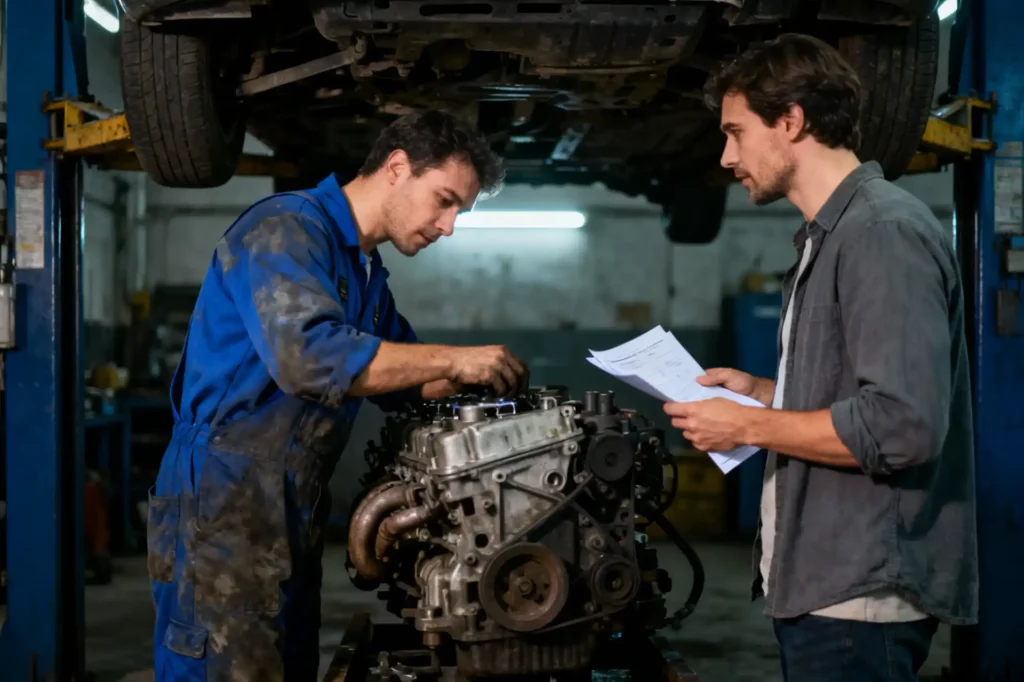Few things are more frustrating than buying a new car only to find yourself back at the dealership again and again for the same repair. If your dealer has tried multiple times and still can’t resolve the problem, you might be driving what’s known as a “lemon.” Understanding what to do when a dealer can’t fix your car can help you protect your rights under federal and state lemon law protections.
In this guide, we’ll explain the key steps to take when repeated repairs fail, how lemon laws work in 2025, and what you can do to pursue a refund or replacement vehicle.
1. Recognize When Repairs Have Reached the Legal Limit
Every state defines “reasonable repair attempts” differently, but most laws share one common threshold: if the same issue persists after several repair visits — usually three or four — or your vehicle has spent 30 or more cumulative days in the shop, it may qualify as a lemon.
Keep detailed records of each visit, including:
- Dates the car was dropped off and returned
- Descriptions of the problem and parts replaced
- Repair orders and invoices from the dealership
Accurate documentation is your strongest evidence if you later file a dealer can’t fix your car lemon law claim.
2. Give the Manufacturer a Final Repair Opportunity
Before pursuing a legal remedy, most states require giving the manufacturer one final chance to fix the defect. This is often done through a certified “last repair attempt” notice.
Send a written letter to the manufacturer’s customer service department by certified mail, describing the issue, repair history, and that this is their final opportunity under your state’s lemon law. Keep a copy and proof of mailing for your records.
For sample letters and contact addresses, check your vehicle’s warranty booklet or visit the National Highway Traffic Safety Administration (NHTSA) recall database.
3. Understand Your State Lemon Law Rights
Although lemon laws exist in every U.S. state, the rules vary. Some cover new cars only; others include used or leased vehicles. For example:
- South Dakota Lemon Law covers vehicles purchased within one year of the first delivery date.
- Vermont Lemon Law extends protection up to two years or 18,000 miles.
Knowing your specific state limits can determine whether your vehicle qualifies. Most states also follow the federal Magnuson-Moss Warranty Act, which allows recovery of attorney fees if you win your case — making legal representation more accessible.
4. File a Lemon Law Claim or Arbitration
If the manufacturer can’t or won’t fix your vehicle, you can begin the claim process. Many automakers offer arbitration programs as an initial step, which are free for consumers and can sometimes result in a refund or replacement without going to court.
During arbitration, you’ll present repair records, your purchase contract, and communication with the dealer. If the arbitrator sides with you, the manufacturer must comply with the decision — or you can escalate the case to a lemon law attorney for further action.
For most drivers in 2025, online filing has made the process faster. You can usually initiate arbitration directly through the manufacturer’s website or your state’s consumer affairs department.

5. Know What Remedies You May Be Entitled To
If your car qualifies as a lemon, you could receive one of the following outcomes:
- Full refund: The manufacturer repurchases the vehicle and reimburses registration, taxes, and related fees.
- Replacement vehicle: You receive a comparable new car under warranty.
- Cash settlement: You keep the vehicle and receive compensation for loss of value or repair costs.
The outcome depends on your state’s laws and whether you have pursued arbitration or a court claim. Always confirm with a licensed lemon law attorney to determine which remedy best fits your situation.
6. What If the Dealer Blames You?
Dealers sometimes argue that a problem results from driver misuse or lack of maintenance. This is a common defense tactic — but don’t be intimidated. If the same issue existed early in ownership and appeared repeatedly, it’s unlikely to be your fault.
Keep all maintenance receipts and ensure any factory recalls are performed. These records prove that you’ve followed proper care guidelines and strengthen your dealer can’t fix your car lemon law argument.
7. The Role of a Lemon Law Attorney
While lemon law claims can begin with arbitration, many consumers choose to hire an attorney if negotiations stall. The good news? Under federal law, manufacturers may be required to pay your attorney’s fees if you win.
A lawyer specializing in lemon law can:
- Review your case and determine eligibility.
- File formal complaints and represent you in negotiations.
- Ensure your refund or replacement is calculated accurately.
To find an attorney in your state, browse our Lemon Law Blog for lawyer recommendations and case resources.

8. Avoid Common Mistakes That Can Delay Your Claim
- Failing to keep written records of every repair visit.
- Not giving the manufacturer a final written repair opportunity.
- Missing state filing deadlines — usually 12 to 24 months from delivery date.
- Attempting to fix the issue yourself, voiding the warranty.
Each of these errors can weaken your case, so follow procedures carefully and keep every document organized. Many states now allow digital submission of repair invoices to make the process easier.
9. The Future of Lemon Law Protection
In 2025, consumer protection laws continue to evolve. Some states are expanding lemon law coverage to include electric vehicles (EVs), hybrids, and even certified pre-owned models. Manufacturers are also required to maintain detailed digital repair records, giving buyers easier access to a vehicle’s history.
This growing transparency empowers consumers — ensuring that when a dealer can’t fix your car, you’re not left without recourse.
10. Final Steps to Take Today
If you suspect your car qualifies as a lemon, act now. Follow these three steps:
- Gather every repair order, invoice, and warranty document.
- Send a final repair request to the manufacturer by certified mail.
- Consult with a qualified lemon law attorney if repairs continue to fail.
Don’t wait until your warranty expires. Acting quickly helps preserve your rights and can increase your compensation. If you’re unsure where to start, explore our state lemon law guides or contact us directly for help finding a professional in your area.
Helpful Resources
- FTC – Understanding Vehicle Warranties
- NHTSA – Vehicle Safety & Recall Database
- Lemon Law Lawyer Advice Blog – State Lemon Law Resources
Final Thoughts
When a dealer can’t fix your car after multiple attempts, you don’t have to accept ongoing frustration or financial loss. Lemon laws exist to protect you from defective vehicles and ensure fair compensation. With proper documentation, persistence, and expert help, you can turn your bad car experience into a resolved case — and a fresh start behind the wheel.
Your rights matter. Protect them with knowledge — and the right legal advice.
